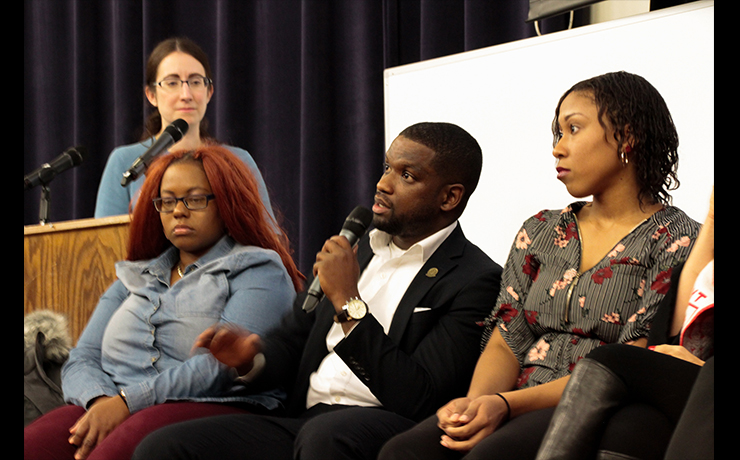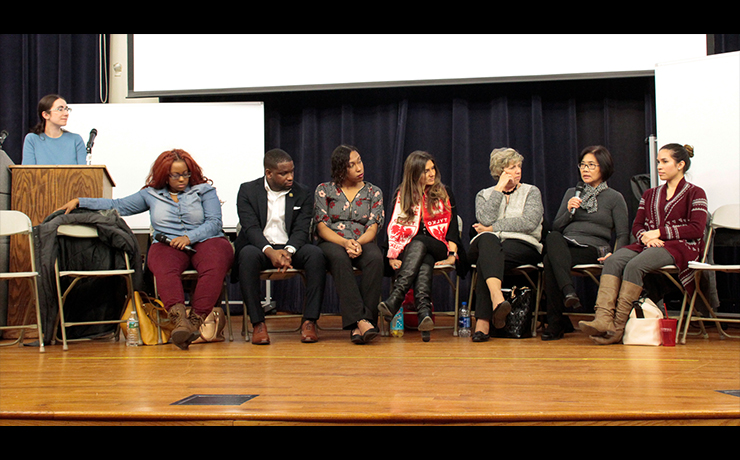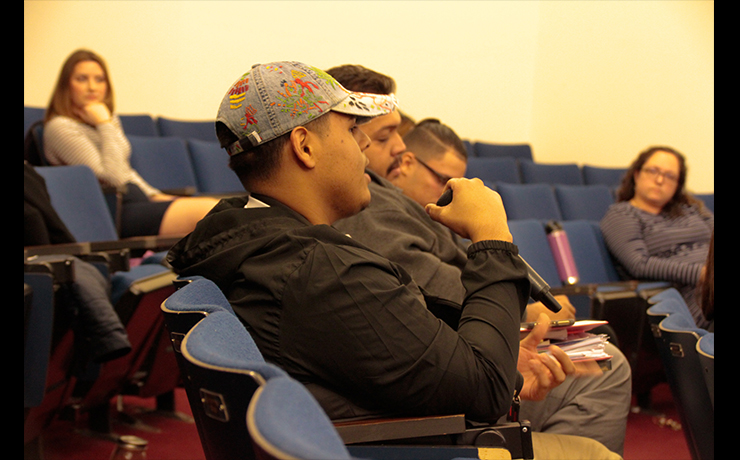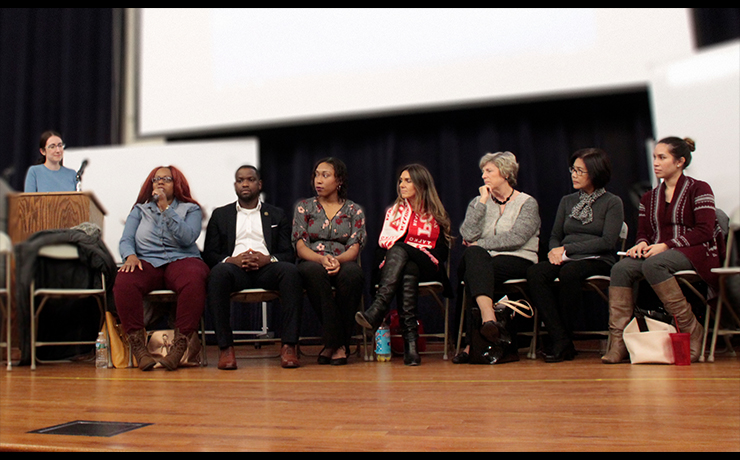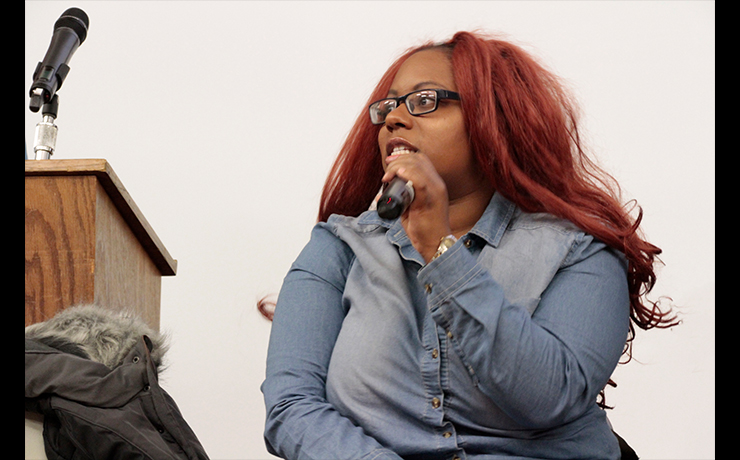Caldwell University
November 2, 2018
‘I am first generation. I am Caldwell’ is theme of forum
Caldwell, N.J., Nov. 2, 2018 – “I am first generation. I am Caldwell” was the theme of a forum at Caldwell University on Oct. 30. Students, faculty, staff and administration shared their experiences of being the first members of their families to attend or graduate from college or the first to receive their undergraduate or graduate degrees in the United States.
The moderator of the panel was Elizabeth Elices, Caldwell’s compliance manager and Title IX coordinator. She also co-chairs the Diversity and Inclusion Committee with Dr. Bonnie French, assistant professor of sociology and criminal justice. Elices opened the forum by recounting how her family escaped the revolution in Cuba and came to the United States.She was the first in her family to go to graduate school; she went on to become a lawyer. “When I passed my bar exams, I didn’t get sworn at the big ceremony in Trenton. I took my oath as a new attorney at the Bergen County Courthouse—where years before, my father had taken his oath to become a new citizen in the United States.”
Elices guided the panelists in discussing topics such as how they responded to challenges as they navigated being a first, where they found support, what advice they have for others facing similar circumstances and how being a first has shaped them.
Jhoanna Oliva-Marquez’s parents were immigrants from Peru. As a result, she did not know how to navigate the college experience. “Sometimes you just don’t know who to go to,” she said. She worked through college to afford it. Balancing classes, homework, her job, family and friends was a challenge, but she graduated and went on to earn her master’s degree. Today as a senior academic advisor at Caldwell, Oliva-Marquez can relate to many first-generation students. She advises them not to be afraid to take opportunities, recalling how she accepted an internship with no pay or credits and it turned out to be a positive experience for the start of her professional life.
Christine Millien, a senior studying business administration, grew up the youngest of five children. Her parents were from Trinidad, and her other siblings were born there. Even though she was born in the United States, she said she went through culture shock as a child since she was from an immigrant family. When she graduates this December, a semester early, she will be the first person in her family to earn a college degree. “Don’t be afraid of differences. You are uniquely beautiful,” she told students in the audience. “Learn to love yourself first … don’t wait for someone else to tell you that you are doing good; you are your biggest cheerleader. You need to find your purpose and work for that.”
R. B. Alverna, a doctoral student in Caldwell’s educational leadership program, was the first in his family to earn a college degree. He came to the United States from his native Haiti as a child. Alverna recalled how growing up his father provided for the family financially but was not there for him emotionally. Therefore, it was a great joy to hear his father say he was proud of him when he earned his undergraduate degree. As a first-generation student, Alverna felt the pressure to succeed, so for a time during college, he would not return his mother’s phone calls because hearing her voice added to the pressure. Maturity showed him that was wrong. “Don’t ignore your parents. Speak to your parents in college … my mom is my best friend.” Today in his work as the coordinator of Project L.E.A.P. at Hudson Community College and as a husband and a father, he stresses the importance of honest communication and of admitting mistakes. He encourages other adults to “make sure you educate youth to make wise post-secondary decisions.”
Jenelle McLeod, a graduate student in Caldwell’s counseling program, was the first in her family to attend college. Being prepared, observant and on top of things was important to her. “Stay ahead of the game; talk to other students and professors and get involved.” Students need to be aware of the “golden ticket” they have with networking capabilities, she said. As a counseling student, she knows “self-care” is important and advises students to be mindful of that.
Yang Cai, professor of sociology, grew up in communist China. When entrance to graduate studies in the United States became more available, Cai’s family scraped together enough money for her to pursue her graduate studies in sociology. When she came to this country to study at the University of Georgia, she faced many obstacles, including financial and cultural barriers. One significant challenge for her was learning how to critique scholars’ work since she grew up in a culture that does not encourage students to challenge others, especially people in authority. Today she pushes her students to inquire and to question. “Critical thinking is a privilege,” said Cai. Her years of living without much money has also taught her—as she tells her children—that “we don’t need a lot of things to be happy.”
Monika Sywak, assistant professor of finance, came to the United States from Poland when she was 23 years old. She worked in a department store, but she knew she wanted to pursue higher education. When Sywak said she was leaving to attend college, she got some pushback from her employer, who asked why she wanted to go further. She went on to pursue her bachelor’s degree while working six or seven days a week—full-time at a bank and one day a week at the department store. She earned an MBA and her doctorate and had a career in corporate America. When Sywak starts a semester with her business students she shares a quote she likes: “If your dreams do not scare you, they are not big enough.”She encourages first-generation students to “dream big.”
The president of Caldwell University, Dr. Nancy Blattner, shared how she attended Southeast Missouri State University in her hometown of Cape Girardeau, Missouri, as the first in her family. Her parents did not go to high school yet they worked hard so their daughter could have a good education. Many of her aunts and uncles had only third- and fifth-grade educations since they were born in the early 20th century to rural farming families.
Blattner said that she grew up “on the wrong side of the tracks” and that her childhood life consisted mainly of going to “school, church, a part-time job and the library.” As a result, she became a voracious reader, which benefited her as she excelled in her studies. When it was time for college, she had several full-ride scholarships including one she wanted to take at Washington University farther away from her home. However, she turned it down. Her father—who believed in her and was proud of her—told her that if she lost that scholarship she would have to move back home and go to Southeast because he and her mother could not help her financially. “I thought about what he told me, and not trusting my untested capabilities, I enrolled at Southeast … I don’t regret the decision … still I have wondered how my life might have been different if I had felt more confidence in myself and tested my abilities by taking the scholarship to Wash U. ”
Blattner worked hard to perform well on CLEP exams so she could earn credits to reduce her expenses at Southeast. When she entered the university her family had never been on the campus to experience cultural or social offerings. “It simply wasn’t part of our lifestyle.” She went on to earn her bachelor’s, master’s and doctoral degrees and has had many accomplishments including serving on state and national higher education boards. Blattner advises other first-generation students to remain strong as they confront obstacles and to stay connected with their loved ones no matter how much they achieve. “I love my family, and my parents gave me many gifts: a strong work ethic, a deep Catholic faith and a desire for the education that they were never able to obtain.”
The program was sponsored by the university’s Diversity and Inclusion Committee.






